
Spilomelinae is a very species-rich subfamily of the lepidopteran family Crambidae, the crambid snout moths. With 4,135 described species in 344 genera worldwide, it is the most speciose group among pyraloids.

Herpetogramma is a genus of moths in the family Crambidae described by Julius Lederer in 1863. It currently comprises 106 species that are found in North America, Eurasia, Australia, New Zealand, Central and South America. Of the few species where host plants are known, the larvae mostly feed on grasses.
Prorodes is a genus of moths of the family Crambidae. It was described by Charles Swinhoe in 1894, with Prorodes mimica as type species.

Asota is a genus of moths in the family Erebidae first described by Jacob Hübner in 1819. Species are widely distributed throughout Africa, India, Sri Lanka, Myanmar, the Malayan region and tropical parts of the Australian region.
Odontocraspis is a monotypic moth genus in the family Lasiocampidae first described by Swinhoe in 1894. Its single species, Odontocraspis hasora, described by the same author in the same year, is found from the Khasi Hills of India to the Sunda Islands of Borneo.
Callocasta is a monotypic moth genus in the family Geometridae described by Charles Swinhoe in 1894. Its only species, Callocasta similis, described by Frederic Moore in 1888, is found in Darjeeling, India.

Herochroma is a genus of moths in the family Geometridae. The genus was described by Charles Swinhoe in 1893.
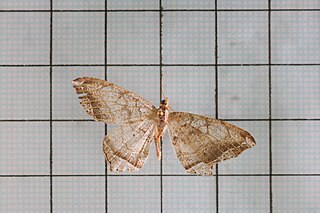
Oxymacaria is a genus of moths in the family Geometridae described by Warren in 1894.
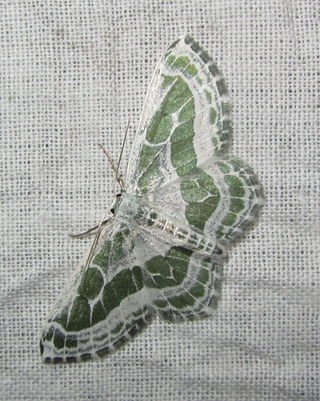
Pseudeuchlora is a monotypic moth genus in the family Geometridae erected by George Hampson in 1895. Its only species, Pseudeuchlora kafebera, was first described by Charles Swinhoe in 1894. It is found in Asia, including India.

Ruttellerona is a genus of moths in the family Geometridae first described by Charles Swinhoe in 1894.
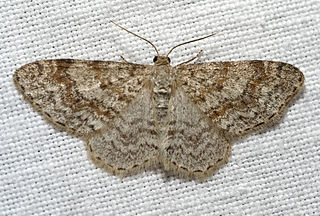
Asthenini is a tribe of geometer moths under subfamily Larentiinae first described by Warren in 1893. The tribe has been combined with Eupitheciini in the past, most notably by Jeremy Daniel Holloway in his work The Moths of Borneo.
Abaciscus atmala is a species of moth belonging to the family Geometridae. It was described by Charles Swinhoe in 1894. It is native to the north-eastern Himalayas, Myanmar, Siberut Island and Borneo.

Ceratarcha umbrosa is a moth in the family Crambidae described by Charles Swinhoe in 1894. It is found in Asia, including China, Taiwan and India.
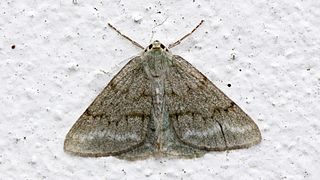
The Pseudoterpnini are a tribe of geometer moths in the subfamily Geometrinae. The tribe was described by Warren in 1893. It was alternatively treated as subtribe Pseudoterpniti by Jeremy Daniel Holloway in 1996.
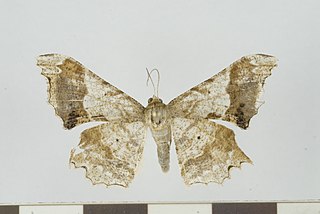
Krananda oliveomarginata is a moth in the family Geometridae first described by Charles Swinhoe in 1894. It is found in the north-eastern Himalayas, China, Taiwan, northern Vietnam, Thailand and on Peninsular Malaysia, Sumatra and Borneo.
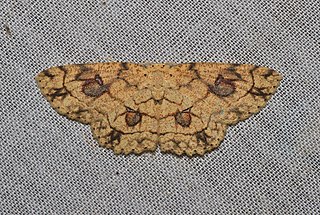
Cyclophora heydena is a moth in the family Geometridae first described by Charles Swinhoe in 1894. It is found in the north-eastern Himalayas and on Borneo and Java.
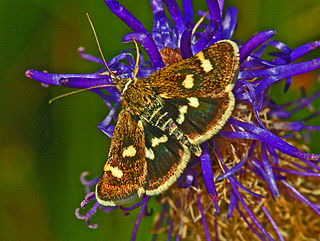
Odontiinae is a subfamily of moths of the family Crambidae. The subfamily was described by Achille Guenée in 1854.
Prorodes mimica is a moth in the family Crambidae. It was described by Charles Swinhoe in 1894. It is found in north-eastern India, Myanmar, Malaysia, Ambon Island, New Guinea and Australia, where it has been recorded from New South Wales and Queensland.
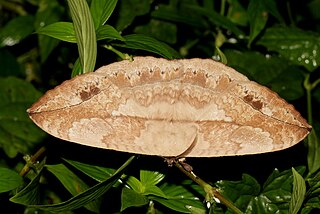
Eupterote is a genus of moths in the family Eupterotidae. It was first described by Jacob Hübner in 1820.













